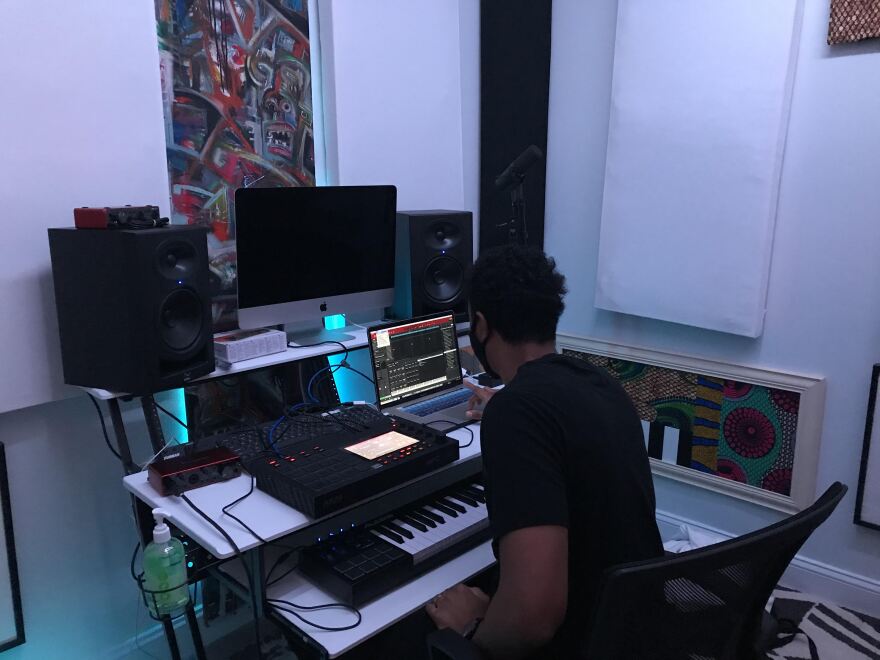In the dark, narrow hallway at GrindHaus Studios, a neon blue light glows near the ceiling, creating a nightclub aura. Soft music beats thump from the open door of one room, and Jason Jet offers some instructions.
“Kind of talk in the hallway and listen to yourself talk,” he says.
In what he calls “The Tunnel” nothing seems amiss. Jet ducks into the doorway of the room known as "The Gallery."
“Then come in here and close the door,” he says.
Inside the soundproofed, specially outfitted recording room, voices sound crisper, less muffled. It’s as if you had been swimming underwater and you’ve suddenly burst through the surface and cleared your ears. This is what voices and music are supposed to sound like.
“Yeah, you can hear it,” Jet says. “It's crazy how sound works. We can't see it, but it's actually doing all this stuff, so it has its own life. It's deep.”

There’s a difference in the quality of sound when rooms are soundproofed with layers of insulation and sheetrock and other specifications discovered through hours of research. Jet hopes musicians and podcasters in Charlotte will understand and appreciate that and opt for memberships at his newly opened coworking music studio, GrindHaus.
Jet’s long-held dream of opening a music coworking space – he first envisioned it in middle school and mentioned it in WFAE’s Amplifier podcast in 2018 -- came to fruition in late January. His goal is to offer professional-quality recording and producing services to anyone who needs it. GrindHaus offers monthly memberships, hourly packages and add-on mixing and mastering services.
Prices range from a $75 set-up fee to $575 for eight hours in the "Flagship studio." He calls it "a YMCA for music."
“It's a monthly membership, so it's literally like a YMCA,” Jet says. “But if you're a musician, it's the perfect place. Or even if you do a podcast, we have that and we also have a livestreaming room.”
Jet began working on the project in May 2020, and the R&B artist says he spent the past year as a “construction worker.” With the help of friend and collaborator Cupid Omalari, they built out GrindHaus’ two recording/producing rooms – "The Gallery" and "The Game Room" – along with a podcasting room called “The Calm” and the focal point, a studio/livestreaming space attached to a production room complete with a 64-track soundboard.
Building out the interior in space leased in an office park off Latrobe Drive in east Charlotte took away from Jet’s life as a singer and songwriter. The Charlotte native first burst onto the scene in 2010 with his debut album “Love Boulevard.” He opened for another Queen City native, Anthony Hamilton, at the Fillmore Charlotte, which led to the Grammy winner declaring Jet the “next best thing to come out of Charlotte.”
Still, Jet managed to record a new album over the course of the year, and it’s slated to come out later in 2021. But he recorded it all at his home studio, and after listening to it in GrindHaus … well, he might need to re-record.

“I hear things in this (mixing) room, it's like, man, I would have never heard it in that environment (at home),” he says.
And although Jet knows it’s a gamble to create a new coworking concept in the midst of a pandemic, he also is betting on it filling a void in Charlotte. Right now, he says, musicians’ options for recording are either to use a home studio or to rent out a pricey professional studio for a quick session.
”A lot of people make music at home, and I was very aware of that before I created this because I was going back and forth for a while -- like, do people actually need this?” he says. “But once I started to sit down and think about it, I know I needed it. And I do music all the time. So, I know a lot of artists need a space that's maybe not a million-dollar studio, but it's good enough to where you can get what you need to get done and have quality. So, I just wanted to raise the standard of quality for artists in Charlotte.”

He also hopes to elevate and discover new artists in Charlotte by not only giving them a place to record but also place to be promoted. He plans to start a YouTube livestreaming series called GrindHaus Sessions – modeled after something NPR listeners should know.
“It's basically going to be a platform for us to showcase our artists in the city, kind of like an NPR Tiny Desk, but a little bit more produced -- we've got stage lights and all of that stuff,” he says.
In the midst of a pandemic where live music is nearly impossible to find, Jet thinks it’ll be a much-needed outlet for both performers and listeners.
And as someone who understands how sound works, now, he knows it’ll sound good in the room he created.
“Now every time I walk in a room somewhere I can tell the qualities of the acoustics and all that,” he says.



